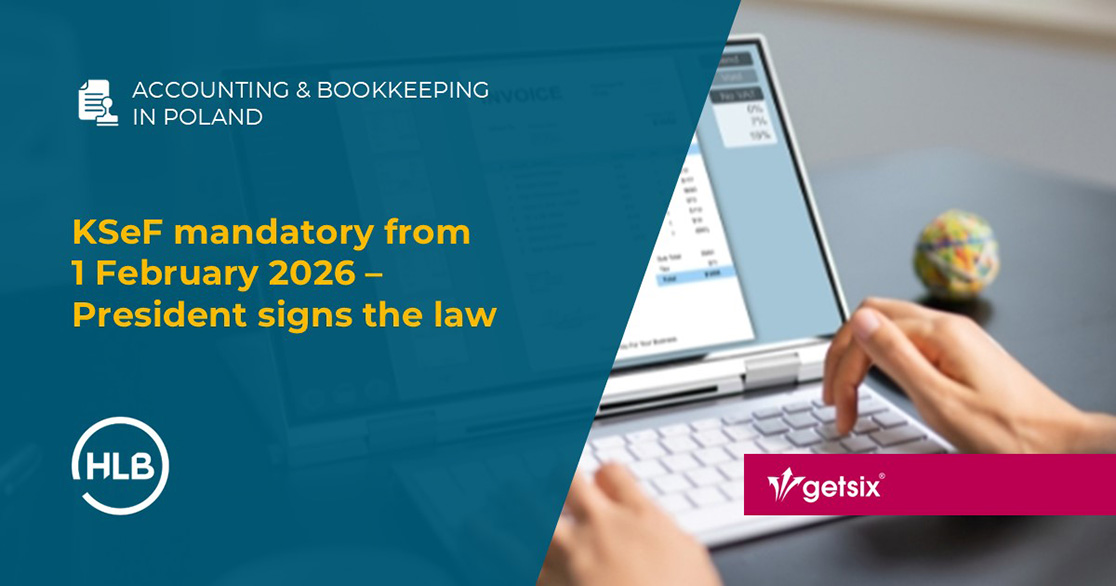KSeF mandatory from 1 February 2026 – President signs the law
5 September 2025
5 September 2025

On 27 August 2025, the President of Poland signed the Act of 5 August 2025 amending the VAT Act and the KSeF Act. This concluded the legislative process and confirmed that the National e-Invoice System (KSeF) will become mandatory from 1 February 2026.
The new regulations amend both the VAT Act of 2004 and the KSeF Act of 2023. The legislator’s aim, as indicated in the explanatory statement, is to give taxpayers sufficient time to adapt their accounting systems and to avoid unnecessary costs and disruptions to business activities.
The Act does not change the main date of entry into force of KSeF, which has been set for 1 February 2026. The obligation to use e-invoicing is expected to be introduced gradually in three stages:
This schedule is intended to mitigate the effects of the reform and spread the obligations over time. In practice, however, this means that large companies will have to be ready for a full transition to the e-Invoice system by the beginning of 2026.
As indicated in the explanatory statement, the solutions are intended to facilitate taxpayers’ preparation for mandatory e-invoicing, so that the implementation of the system into company accounting solutions takes place without excessive costs and the risk of disruption to business activities.
The Act stipulates that e-invoicing in KSeF will cover both active taxpayers and those exempt from VAT. At the same time, transitional provisions have been provided for, which allow the use of paper or electronic invoices in certain situations:
The amendment clarifies the rules for using the offline mode, i.e. issuing invoices outside KSeF in emergency situations. Clear rules have been introduced which specify:
Until now, KSeF did not provide for the possibility of sending attachments to invoices. The new regulations allow attachments to be added, provided that the intention to use them is notified in advance. The attachment will be treated as an integral part of the e-invoice, which will increase the usability of the system, especially in transactions requiring additional documentation.
Taxpayers will be able to obtain an access certificate to KSeF in advance, starting from 1 November 2025. This will allow them to conduct technical tests and prepare their accounting systems in advance, before the obligation comes into force on 1 February 2026.
The Act also introduces episodic provisions (Article 145ka of the VAT Act) which adapt the regulations concerning the deposit system to the new legal reality.
The President’s signing of the Act confirms that KSeF is becoming a reality. Companies should begin preparations in three key areas:
This is not only a technical change, but also a reorganisation of many business processes – from accounting, through sales, to administration and controlling.
Although the act concludes the legislative stage, many doubts remain in practice:
These issues could be resolved through tax explanations or general interpretations, which would provide taxpayers with greater certainty regarding the application of the new regulations. At this stage, however, the Ministry of Finance has indicated that it does not plan to issue such documents, focusing instead on information and training activities.
Practice shows that the implementation of KSeF cannot be limited to installing a module in an accounting programme. Companies should take comprehensive measures:
It is crucial to start these activities in 2025 to avoid the risk of operational disruptions in 2026.
The signing of the act by the President is a turning point – from 1 February 2026, KSeF will become mandatory and will cover all VAT taxpayers. This means that companies must not only adapt their accounting systems, but also prepare themselves organisationally and procedurally. Time is running out – the implementation process should start now.
Mandatory e-invoicing is a significant challenge for businesses: it requires software updates, employee training, and the restructuring of certain business processes. At the same time, the reform offers an opportunity to:
A well-planned implementation will help avoid problems in the first months of the system’s operation, such as delays in accounting, loss of liquidity or disputes with contractors.
If you have any further questions or require additional information, please contact your business relationship person or use the enquiry form on the HLB Poland website.
***
Download the brochures providing general information and outlining the services that are offered by HLB member firms.
Learn moreClick below for more detailed information regarding population, major towns and cities, language, religion and holidays in Poland.
Learn more